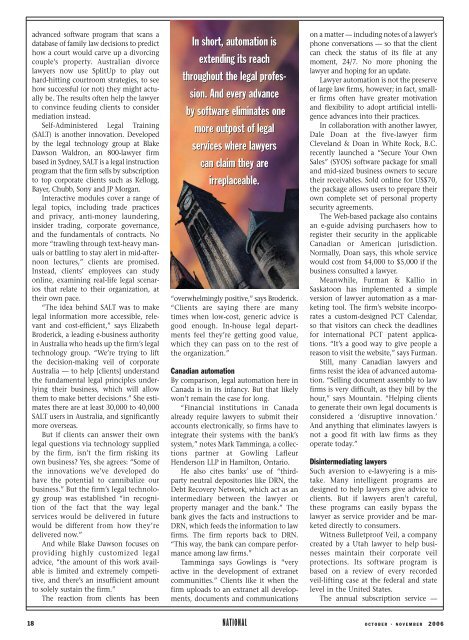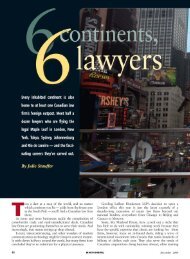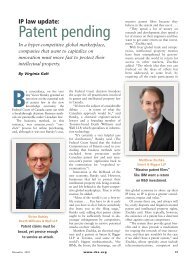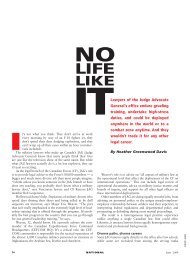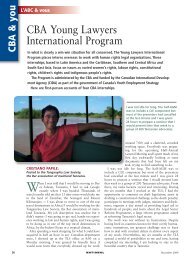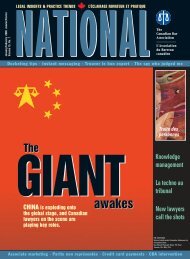ROBO-LAWYERS! ROBO-LAWYERS! - National
ROBO-LAWYERS! ROBO-LAWYERS! - National
ROBO-LAWYERS! ROBO-LAWYERS! - National
Create successful ePaper yourself
Turn your PDF publications into a flip-book with our unique Google optimized e-Paper software.
advanced software program that scans a<br />
database of family law decisions to predict<br />
how a court would carve up a divorcing<br />
couple’s property. Australian divorce<br />
lawyers now use SplitUp to play out<br />
hard-hitting courtroom strategies, to see<br />
how successful (or not) they might actually<br />
be. The results often help the lawyer<br />
to convince feuding clients to consider<br />
mediation instead.<br />
Self-Administered Legal Training<br />
(SALT) is another innovation. Developed<br />
by the legal technology group at Blake<br />
Dawson Waldron, an 800-lawyer firm<br />
based in Sydney, SALT is a legal instruction<br />
program that the firm sells by subscription<br />
to top corporate clients such as Kellogg,<br />
Bayer, Chubb, Sony and JP Morgan.<br />
Interactive modules cover a range of<br />
legal topics, including trade practices<br />
and privacy, anti-money laundering,<br />
insider trading, corporate governance,<br />
and the fundamentals of contracts. No<br />
more “trawling through text-heavy manuals<br />
or battling to stay alert in mid-afternoon<br />
lectures,” clients are promised.<br />
Instead, clients’ employees can study<br />
online, examining real-life legal scenarios<br />
that relate to their organization, at<br />
their own pace.<br />
“The idea behind SALT was to make<br />
legal information more accessible, relevant<br />
and cost-efficient,” says Elizabeth<br />
Broderick, a leading e-business authority<br />
in Australia who heads up the firm’s legal<br />
technology group. “We’re trying to lift<br />
the decision-making veil of corporate<br />
Australia — to help [clients] understand<br />
the fundamental legal principles underlying<br />
their business, which will allow<br />
them to make better decisions.” She estimates<br />
there are at least 30,000 to 40,000<br />
SALT users in Australia, and significantly<br />
more overseas.<br />
But if clients can answer their own<br />
legal questions via technology supplied<br />
by the firm, isn’t the firm risking its<br />
own business? Yes, she agrees: “Some of<br />
the innovations we’ve developed do<br />
have the potential to cannibalize our<br />
business.” But the firm’s legal technology<br />
group was established “in recognition<br />
of the fact that the way legal<br />
services would be delivered in future<br />
would be different from how they’re<br />
delivered now.”<br />
And while Blake Dawson focuses on<br />
providing highly customized legal<br />
advice, “the amount of this work available<br />
is limited and extremely competitive,<br />
and there’s an insufficient amount<br />
to solely sustain the firm.”<br />
The reaction from clients has been<br />
In short, automation is<br />
extending its reach<br />
throughout the legal profession.<br />
And every advance<br />
by software eliminates one<br />
more outpost of legal<br />
services where lawyers<br />
can claim they are<br />
irreplaceable.<br />
“overwhelmingly positive,” says Broderick.<br />
“Clients are saying there are many<br />
times when low-cost, generic advice is<br />
good enough. In-house legal departments<br />
feel they’re getting good value,<br />
which they can pass on to the rest of<br />
the organization.”<br />
Canadian automation<br />
By comparison, legal automation here in<br />
Canada is in its infancy. But that likely<br />
won’t remain the case for long.<br />
“Financial institutions in Canada<br />
already require lawyers to submit their<br />
accounts electronically, so firms have to<br />
integrate their systems with the bank’s<br />
system,” notes Mark Tamminga, a collections<br />
partner at Gowling Lafleur<br />
Henderson LLP in Hamilton, Ontario.<br />
He also cites banks’ use of “thirdparty<br />
neutral depositories like DRN, the<br />
Debt Recovery Network, which act as an<br />
intermediary between the lawyer or<br />
property manager and the bank.” The<br />
bank gives the facts and instructions to<br />
DRN, which feeds the information to law<br />
firms. The firm reports back to DRN.<br />
“This way, the bank can compare performance<br />
among law firms.”<br />
Tamminga says Gowlings is “very<br />
active in the development of extranet<br />
communities.” Clients like it when the<br />
firm uploads to an extranet all developments,<br />
documents and communications<br />
on a matter — including notes of a lawyer’s<br />
phone conversations — so that the client<br />
can check the status of its file at any<br />
moment, 24/7. No more phoning the<br />
lawyer and hoping for an update.<br />
Lawyer automation is not the preserve<br />
of large law firms, however; in fact, smaller<br />
firms often have greater motivation<br />
and flexibility to adopt artificial intelligence<br />
advances into their practices.<br />
In collaboration with another lawyer,<br />
Dale Doan at the five-lawyer firm<br />
Cleveland & Doan in White Rock, B.C.<br />
recently launched a “Secure Your Own<br />
Sales” (SYOS) software package for small<br />
and mid-sized business owners to secure<br />
their receivables. Sold online for US$70,<br />
the package allows users to prepare their<br />
own complete set of personal property<br />
security agreements.<br />
The Web-based package also contains<br />
an e-guide advising purchasers how to<br />
register their security in the applicable<br />
Canadian or American jurisdiction.<br />
Normally, Doan says, this whole service<br />
would cost from $4,000 to $5,000 if the<br />
business consulted a lawyer.<br />
Meanwhile, Furman & Kallio in<br />
Saskatoon has implemented a simple<br />
version of lawyer automation as a marketing<br />
tool. The firm’s website incorporates<br />
a custom-designed PCT Calendar,<br />
so that visitors can check the deadlines<br />
for international PCT patent applications.<br />
“It’s a good way to give people a<br />
reason to visit the website,” says Furman.<br />
Still, many Canadian lawyers and<br />
firms resist the idea of advanced automation.<br />
“Selling document assembly to law<br />
firms is very difficult, as they bill by the<br />
hour,” says Mountain. “Helping clients<br />
to generate their own legal documents is<br />
considered a ‘disruptive innovation.’<br />
And anything that eliminates lawyers is<br />
not a good fit with law firms as they<br />
operate today.”<br />
Disintermediating lawyers<br />
Such aversion to e-lawyering is a mistake.<br />
Many intelligent programs are<br />
designed to help lawyers give advice to<br />
clients. But if lawyers aren’t careful,<br />
these programs can easily bypass the<br />
lawyer as service provider and be marketed<br />
directly to consumers.<br />
Witness Bulletproof Veil, a company<br />
created by a Utah lawyer to help businesses<br />
maintain their corporate veil<br />
protections. Its software program is<br />
based on a review of every recorded<br />
veil-lifting case at the federal and state<br />
level in the United States.<br />
The annual subscription service —<br />
18 NATIONAL<br />
OCTOBER · NOVEMBER 2006


